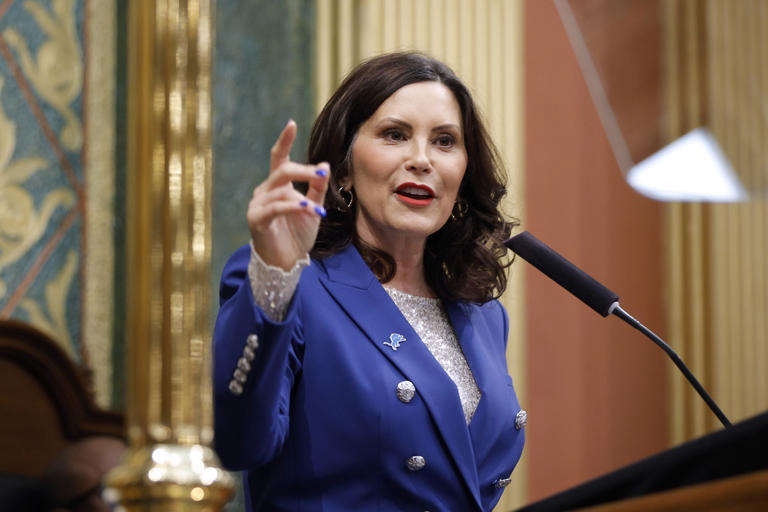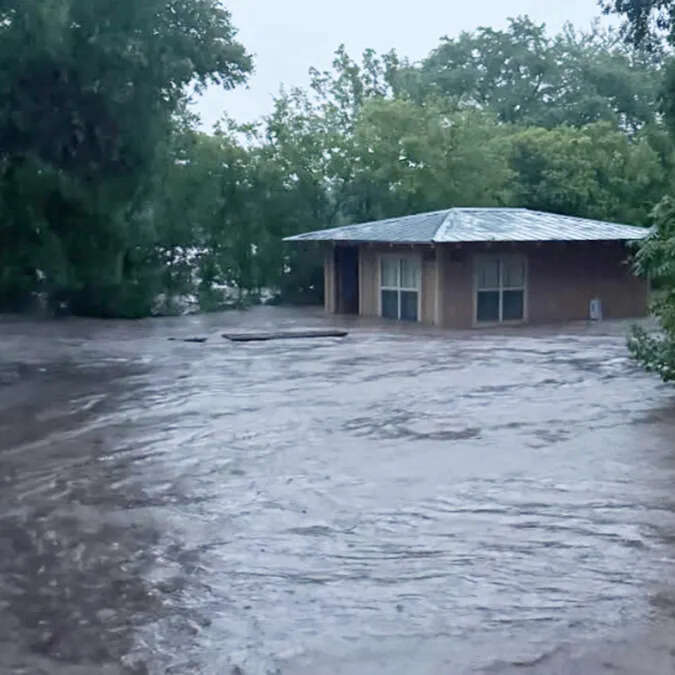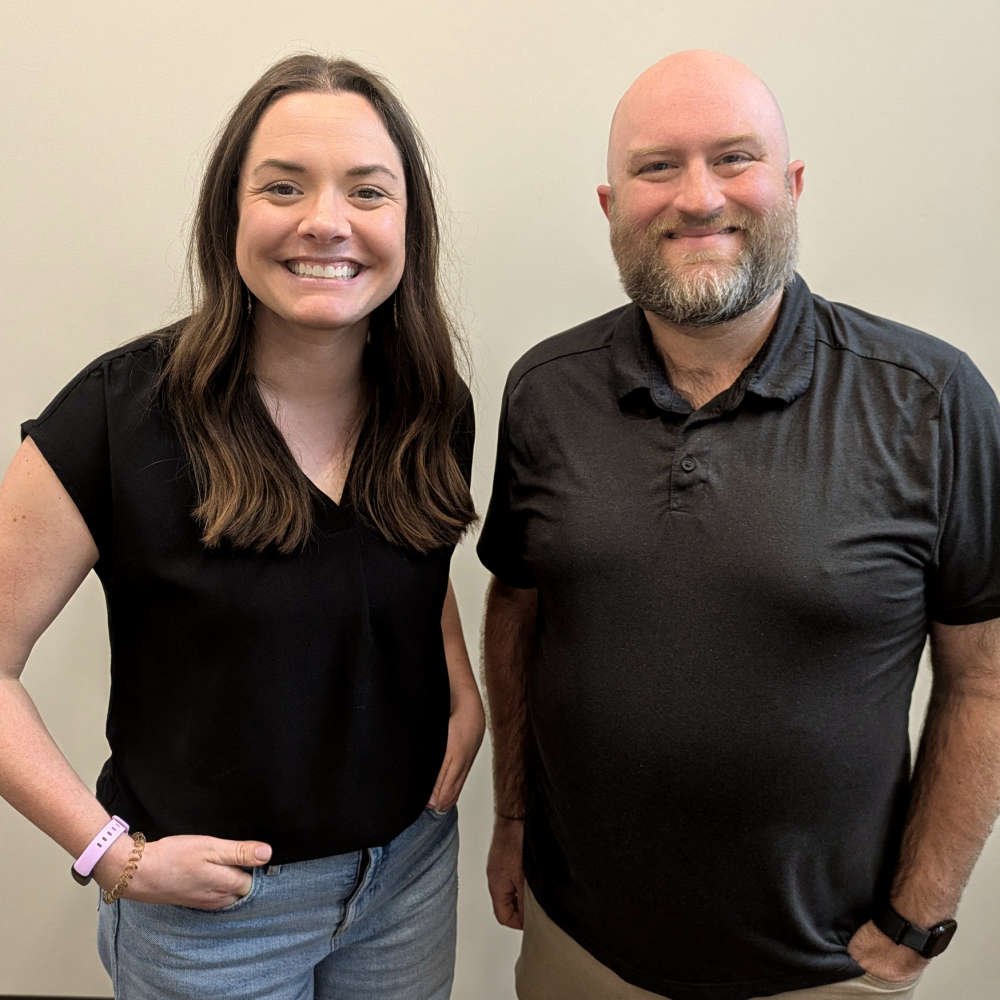
Governor Whitmer shared with lawmakers her $80.7 billion dollar proposed budget for the next fiscal year.
LANSING, Mich. —(Press Release 2/7/24) - Today, Governor Gretchen Whitmer released her fifth executive budget recommendation that will lower costs, grow Michigan’s economy, and build a brighter future for anyone who wants to call Michigan home. The Governor and State Budget Director Christopher Harkins outlined the proposal to a joint session of the Senate and House Appropriations committees Wednesday morning.
The budget recommendation makes investments to support the success of Michigan students and teachers, improve the state’s infrastructure, better the health of residents, protect natural resources, and expand opportunity for families, communities, and businesses.
“Today, I am proud to introduce my executive budget proposal to lower costs, grow our economy, and build a brighter future for anyone who wants to call Michigan home,” said Governor Whitmer. “My budget includes investments to put money back in people’s pockets, help students thrive in school, put more people on paths to higher education and good-paying jobs, rebuild our infrastructure, keep our communities safe, and improve public health. In the months ahead, I look forward to working with my partners in the legislature to deliver a balanced budget that makes a real difference in people’s lives. Let’s get it done.”
The budget recommendation totals $79 billion and it includes a general fund total of $14.8 billion and a School Aid Fund total of $19 billion. It provides a significant amount of one-time funding while maintaining a structural balance in future years and does not utilize one-time funds for ongoing purposes.
“Governor Whitmer’s Executive Budget Recommendation is a proposal for making Michigan a state where everyone can succeed,” said State Budget Director Christopher Harkins. “Through strategic investments we can leverage our state and federal resources to rejuvenate and reinvigorate our state. I look forward to working with the legislature over the next few months to ensure we enact a budget that makes Michigan stronger.”
Lowering Costs
The budget recommendation includes investments to lower costs and help Michiganders fight inflation:
- Rolling back the retirement tax, saving half a million households $1,000 a year.
- Expanding the Working Families Tax Credit (formerly known as the Earned Income Tax Credit, or EITC), providing 700,000 homes nearly $3,200 combined tax refunds.
- Taking the first step toward providing pre-K for all of Michigan’s 4-year-olds, putting children on the path to a brighter future and saving families an average of $10,000 a year.
- Providing up to a $3,000 refundable tax credit to child care and preschool teachers.
- Temporarily pausing the Sales and Use Tax on the purchase of an electric vehicle to save families up to $2,400 off the first $40,000 off the price of an electric vehicles.
"Access to quality child care is critical to workforce attraction and retention," said Warren Call, President and CEO of Traverse Connect. "We are thankful to Governor Whitmer for responding to potential workforce challenges with expanding access to quality pre-K and child care and look forward to working together on potential solutions."
Nationwide, an estimated 25% of diabetic patients are forced to ration insulin because of the high cost – putting their health in serious jeopardy,” said Thomas Veverka, MD, Michigan State Medical Society President. “By helping lower costs for Michigan's diabetic patients, we applaud Governor Whitmer's efforts to help improve health outcomes and potentially save lives."
“General Motors is committed to its vision of a world with zero crashes, zero emissions and zero congestion and the key to reaching our vision is through electric vehicles,” said General Motors. “As we bring more affordable EVs to market, including many built here in Michigan, Governor Whitmer’s proposed plan will help to accelerate EV adoption and put more EVs on the road.”
Education – Getting Kids Back on Track
The budget recommendation continues historic public education investments. It includes the highest per-student investment in Michigan history for the fifth year in a row without raising taxes, landmark funding to help students and adults build critical reading skills, and free breakfast and lunch to all Michigan public school students. The budget includes:
K-12 Education
- $900 million deposit into a new rainy day fund for schools – funds set aside for future budgetary needs – ensuring long-term financial stability of the state’s public education system.
- $614 million to support school operations through a 5% increase in the base per-pupil that equates to an additional $458 per student, for a total of $9,608 per pupil.
- $318 million for school safety programs, building off existing school safety grant opportunities for districts and implementing cross-sector approaches to prevent mass violence through partnerships between schools, public safety, mental health professionals, and communities.
- $442.4 million to help students reach their full academic potential, including expansion of existing payments for literacy grants and literacy coaches.
- $300 million for tutoring through the MI Kids Back on Track program.
- $300 million to continue historic investments for student mental health to ensure students needs can be identified and provided with the right support.
- $257.3 million toward the goal of offering universal preschool to all of Michigan’s 4-year-olds, putting all children on the path to a brighter future.
- $195 million in recognition of the crucial role high-quality teachers play in the success of their students. Including continued support for the MI Future Educator Program (which provides a tuition free path for college students to become certified teachers) and funds to retain and develop existing teachers through mentorship programs.
- $160 million to help students thrive by providing free breakfast and lunch to all of Michigan’s 1.4 million public school students.
- $150 million to fund matching grants for school districts to modernize their bus fleet by switching over to electric vehicles.
- $120 million investment in various educator supports, including continuation of the MI Future Educator Fellowship, student teacher stipends and professional development.
- $94.4 million for literacy-related programs and activities in Detroit public schools.
- $79.9 million to continue expanded support for special education students – a 12.5% increase in the current allocation.
- $66.5 million to provide a 5% increase in funding to support academically at-risk students, English language learners, and students in rural school districts.
- $64.7 million increase, for a total of $812.2 million, in funding for academically at-risk, economically disadvantaged students.
- $30 million supporting new math intervention programs.
- $25 million for additional supports for vocational education and career and technical education equipment upgrades.
- $4 million to establish the Nature Awaits program, providing every Michigan fourth grader with a free field trip to a state park.
“A high-quality public education can put young Michiganders on the path to long-term success,” said David Hecker, President, AFT Michigan. “Since taking office, Governor Whitmer has delivered record investment in public education and this year is no different. Getting this bold budget across the finish line will improve every student’s on-campus and in-class experience.”
“Kids should be focused on learning and growing in school, and for too long, too many children in Michigan have skipped meals or gone hungry,” said Oakland Schools’ Superintendent Dr. Wanda Cook-Robinson. “Governor Whitmer’s proposal to deliver free breakfast and lunch to all 1.4 million students in Michigan will save families at least $850 a year and ensure no kid goes hungry at school.”
“Every student deserves access to personalized support to help them learn and grow,” said Michigan Education Association President Paula Herbart, a longtime teacher from Macomb County. “Gov. Whitmer’s MI Kids Back on Track program will fund tutoring, after-school programs, and other forms of one-on-one learning to help kids catch up and get back on track for long-term success.”
“State investments in school infrastructure are a key part of improving equity and student performance,” said Peter Spadafore, executive director of the Michigan Alliance for Student Opportunity. “Governor Whitmer’s historic investment in school infrastructure will make a difference across the state, helping to ensure all students receive the high-quality education they deserve.”
"Reducing barriers to the outdoors, especially for children from low-income families, is the first step to cultivating the next generation of environmental leaders,” said Elayne Elliott, Director of the Sierra Club Michigan Chapter. “Not only will this program laid out by the Governor ensure all children have the opportunity to experience our great Michigan outdoors, but it will also help children discover their appreciation for nature, encourage an active and healthy lifestyle, and educate future generations of 4th graders about the importance of protecting our natural resources."
Higher Education & Workforce Development
- A 4% ongoing increase for university and community college operations.
- $200 million in Infrastructure, Technology, Equipment and Maintenance (ITEM) funding to assist community colleges and universities improve existing facilities, infrastructure, and technology.
- $140 million to temporarily lower the eligibility age for Reconnect from 25 to 21, making a tuition-free associates degree or skills training available to more Michigan residents who were impacted by the pandemic.
- $100 million additional investment for the ongoing costs of the Michigan Achievement Scholarship, lowering costs for college students, bringing the FY24 investment to $350 million.
- $75 million for the Reconnect Bachelor’s Degree Pathway program to provide college affordability grants to students whose education was disrupted by the pandemic.
- $55 million for a Student Wellness Fund to help universities and community colleges improve student wellness resources on campus.
- $35 million of additional funding for Going Pro to further expand employer-based training grants.
- $35 million for a Retraining and Retooling fund to support small manufacturers address their workforce needs.
- $30 million for Student Wraparound Services and Basic Needs Supports for students at public colleges and universities and tribal colleges to improve graduation and completion rates.
- $25 million for the College Success Fund to provide competitive grants to institutions of higher education to adopt national best practices in strategies shown to improve retention and completion rates.
- $20 million for Talent Retention and Expansion efforts to develop customized solutions to fill talent gaps in key industries.
"In Michigan, we value families, and we're glad Gov. Whitmer is making that apparent with her budget recommendation to ensure more parents and kids have comprehensive healthcare coverage,” said Monique Stanton, President & CEO of the Michigan League for Public Policy. “Families living in our state should have access to care no matter their immigration status—and a five-year waiting period has meant thousands of kids and pregnant people can't get the health services they need during a critical period of their lives. Removing barriers for coverage for kids and parents goes a long way in helping families start out healthy and strong, provides financial security for families and communities, and assures families they belong in Michigan."
Public Health – Strengthening Families
The budget recommendation calls for funding focused on the health of Michigan families. The budget includes a plan for Michigan to manufacture insulin to families hundreds of dollars a month, close maternal health gaps by continuing to fund the Healthy Moms, Healthy Babies program to support groups for new moms and their children, and other initiatives to close racial health disparities. The plan also expands access to family planning services, STI and cancer screenings, and basic lab services to 25,000 people, saving Michiganders an average of $2,000 a year.
- $210.1 million to increase wage support to direct care professionals serving in nursing homes and extended care facilities.
- $150 million for efforts aimed at attracting and establishing a Michigan-based insulin manufacturing facility to lower the cost of insulin while creating new high-skill, high-demand jobs.
- $129.7 million for additional Medicaid health access and equity to improve enrollee access to services.
- $62.1 million to fund Healthy Moms, Healthy babies, a bipartisan program that supports pregnant women, new mothers, and young children.
- $58 million to implement recommendations from the Racial Disparities Task Force, including neighborhood health grants, mobile health units, sickle cell support and more.
- $30 million increase in support to local health departments to provide essential services.
- $15 million to create a new foster care respite care program to provide temporary, occasional relief to foster parents.
- $6.2 million to fund the Medicaid Plan First! program – expanding access to family planning services and cancer screening.
“Affordable access to birth control is a vital tool for health, economic opportunity and reproductive freedom,” said Kathy Bacon, Director of Contraception Choice & Access, Arnold Ventures. “Governor Whitmer’s proposal will help connect 25,000 Michiganders to the quality care they need to decide if, when and how to have a family.”
Public Safety – Keeping Communities Safe
The budget recommendation includes funding to keep families safe, including nearly $500 million that builds on the recent supplemental funding and $1 billion in funding since Governor Whitmer took office. It includes dedicated resources for the first time ever to hire, train, and retain local cops, firefighters, and EMTs and upgrade public safety facilities and equipment. It also funds evidence-based solutions to tackle the root causes of violence, including community violence intervention programming, and delivers on commonsense gun safety legislation—universal background checks, safe storage, and extreme risk protection orders.
- $50.4 million to leverage the State Police Training Academy to serve as a criminal justice training hub to support realistic, multi-disciplinary training opportunities for law enforcement agencies across the state.
- $36.6 million in new statutory revenue sharing (2% ongoing and 5% one-time) dedicated specifically for public safety, including employee recruitment, retention, training, and equipment for first responders.
- $18.2 million to provide in-service training to licensed law enforcement officers.
- $11.5 million for the Selfridge Air National Guard Base to improve and maintain infrastructure at the base to continue to position Michigan to compete for next generation aircraft and future fighter missions.
- $10.8 million to establish the Office of Community Violence Intervention Services to partner with community-based organizations already working to reduce violent incidents.
- $10.4 million to improve safety and accountability in correctional facilities, including $7.1 million to outfit corrections officers with body cameras.
- $9 million to run a Michigan State Police Trooper Recruit School, graduating an anticipated 50 new recruits.
- $5 million to enact various recommendations from the Task Force on Juvenile Justice Reform, including creating a Juvenile Justice Services Division within the State Court Administrative Office and expanding the scope of the Office of the Children’s Advocate.
- $5 million to expand the Jobs Court, a program that aims to reduce recidivism by providing jobs and services to disadvantaged offenders.
- $1.9 million to implement gun violence prevention policies.
- $72 million increase over current year funding, for a total of $220.9 million, for Michigan Indigent Defense Commission grants to local judicial systems across the state.
“The judiciary is grateful to the Governor for this substantial down payment toward achieving critically important goals of the Task Force on Juvenile Justice Reform,” said Chief Justice Elizabeth Clement. “The creation of a coordinating function in the State Court Administrative Office that will help courts and other justice system partners get on the same page with the latest policy, state-of-the-art data collection, and accountability tools is crucial. By filling this coordination gap, stakeholders systemwide can be more effective in working together to help kids at risk get the services they need.”
"Budgets are about priorities. We are thankful that the Governor's budget proposal makes clear that safer communities and better policing are priorities” said Rob Figurski, President, Michigan Association of Police Organizations. “Law enforcement needs resources not rhetoric."
"The Open MI Door campaign is pleased to know the Governor is taking steps to ensure greater transparency within our corrections system,” said Lois Pullano, Executive Director of Open MI Doors Campaign. “Body cams are high on the list of what is necessary inside to prevent further deaths and harm. This will create a safer environment and reduce trauma for all those who are working and living inside. Ohio has implemented them and data shows it has been impactful.”
Rebuilding Infrastructure
The budget recommendation calls for investments in infrastructure to remove and replace lead service lines, improve our roads and bridges, and put Michigan in the lead on future mobility and electrification with a focus on developing our charging infrastructure and electrifying state fleets, including:
Roads, Bridges, Transit, Electrification
- $350 million in a reserve designed to allow the State to leverage infrastructure dollars.
- $200 million investment supporting Michigan's Bridge Bundling program to replace or rehabilitate structurally deficient bridges across the state.
- $160 million for Intermodal Capital Investment Grants to support investments in rail, marine, intercity, and local transit infrastructure that have the potential to leverage federal funding opportunities.
- $65 million to expand electric vehicle charging infrastructure networks and access.
- $41.2 million for the Information Technology and Investment Fund for modernization of legacy IT systems supporting local income tax collections for those communities that elect to participate, environmental permitting and inspection, groundwater protection, occupational safety and health, and talent recruitment and retention.
- $45 million for the Michigan Clean Fleet Initiative to support local governments and businesses transitioning their vehicle fleet to electric vehicles and clean fuels.
- $10 million to begin the transition the of State of Michigan’s fleet to electric vehicles.
- $6.6 million to improve permitting processes and reduce permit issuance wait times.
“Governor Whitmer’s plan for significant investments in electric vehicle fleet conversions and charging will continue to position Michigan as a leader in the advanced mobility industry,” said Dr. Laura Sherman, President of the Michigan Energy Innovation Business Council. “Investments in EV infrastructure, especially for public charging, public transit, and home charger and panel upgrades, will benefit communities across the state. The advanced energy industry looks forward to working with the Governor to put these investments into action to support more well-paying jobs and expanded access to clean transportation.”
“Governor Whitmer continues to be committed to retaining and growing our automotive industry and ensuring Michigan leads in the mobility transformation,” said Glenn Stevens, Executive Director of MichAuto. “From the EV supply chain to the infrastructure that is required, Michigan must demonstrate our leadership role. The administration is focused on actions to ensure Michigan has the required talent, policies, and infrastructure in place for the electrification of our industry. The initiatives and funding proposed in the budget are another enabling step forward to make that happen.”
Housing
- $212 million for residential energy efficiency improvements through federal funds via point-of-sale rebates for home appliances, water heaters and more.
- $100 million for the Community Downtown Economic Development Program to provide competitive grants for community development and placemaking efforts in downtowns.
- $50 million in funding for Revitalization and Placemaking Program grants used to rehabilitate vacant, underutilized, blighted and historic structures and develop place-based infrastructure to revitalize communities.
- $50 million for the Housing and Community Development Program to alleviate affordable housing needs across the state and revitalization downtown areas in Michigan.
- $15 million to address workforce housing needs in the food and agriculture industry by providing grants to improve living conditions and housing options for migratory agriculture workers.
- $10 million to acquire, renovate and resell State Land Bank properties to expand attainable housing options while emphasizing use of skilled trades apprentices.
Water, Parks, Agriculture, Environment
- $226 million to remove and replace 40,000 lead service lines across the state over 10 years.
- $122.5 million to ensure the quality and safety of Michigan drinking water. Funding will support water filter distribution as well as faucet and plumbing replacement in communities with lead contamination in water.
- $100 million to establish an environmental justice contaminated site clean-up fund to remediate and redevelop contaminated sites in historically disadvantaged and underrepresented communities.
- $5.2 million for orphan oil and gas well remediation to continue efforts to seal and remediate abandoned oil and gas wells, and adjacent areas, throughout the state.
- $10 million in funding for MI Climate Smart Farming to assist farmers who choose to implement regenerative agriculture practices, to benefit the environment.
- $7.8 million in state parks operations funding to provide additional park rangers and provide essential resources to state parks.
- $5 million for Michigan Saves to incentivize private investment in clean energy improvements for Michigan residents and businesses.
“In Michigan, our water is part of who we are, and that means we must ensure all communities, regardless of zip code, have safe, clean and affordable drinking water,” said Lisa Wozniak, Executive Director of the Michigan League of Conservation Voters. “We have an opportunity to protect our health now and into the future by replacing lead pipes, investing in our groundwater and making sure water is affordable for communities across Michigan. We appreciate Governor Whitmer's leadership and continued commitment on investing in our water from source-to-tap.”
“The Michigan Chamber believes strongly in a diversified approach to the state’s energy generation portfolio to ensure competitive rates for energy customers—families, communities and businesses alike. As we continue to achieve lower emissions in our energy sector, renewable energy technologies are critical components of our sustainable energy future,” said Mike Alaimo, Director of Environmental and Energy Affairs at the Michigan Chamber of Commerce. “This program and investment is an important step to overcoming the siting barriers that stand in the way of greater deployment, and will rightly support communities that want to help Michigan move into a clean energy future.”
“The delivery of safe and clean water is the top priority of every municipal water system in Michigan,” said Dan Gilmartin, Executive Director and CEO of the Michigan Municipal League. “This budget continues to invest in the need to remove lead service lines from our water systems. Combined with recent investments by federal, state, and local leaders, we are making a long-term commitment to improve our infrastructure and build resilient and adaptable systems.”
Economic Development
The budget recommendation calls for funding centered on economic development, including:
- $500 million annual deposit in the State’s bipartisan Strategic Outreach and Attraction Reserve (SOAR) Fund.
- $200 million over 10 years for the Onshoring Clean Energy Supply Chain Tax Credit, designed to encourage businesses to invest in clean manufacturing and industrial decarbonization projects.
- $200 million for the Michigan Regional Empowerment Program to support the growth, development, diversification, and resiliency of regional economies through a competitive grant process.
- $135 million for the Michigan Main Street Initiative to provide supports to start, grow, and expand small and micro businesses.
- $15 million in federal funding to supplement the $15 million ongoing funding for Pure Michigan to continue promoting the state as a great place to live, work, and play.
- $10 million to support outdoor recreation businesses, including outdoor retailers, supply base companies, and outdoor recreation service providers.
- $10 million to promote Michigan as a destination for special events and national conventions
- $5 million for the Michigan Defense Center to protect and grow the defense and homeland security industry in Michigan.
- $2 million for the Arsenal of Innovation Fund to expand research and development around mobility in the defense industry and support innovation of new technologies.
The budget recommendation also proposes a $200 million deposit to the Budget Stabilization Fund, which would bring the rainy day fund balance to nearly $2 billion by the end of Fiscal Year 24, an all-time high.
Additionally, $88.9 million is included to provide a 5% increase in both ongoing and one-time statutory revenue sharing to help counties, cities, villages, and townships; and new dedicated statutory revenue sharing funds, 2% ongoing and 5% one-time, for public safety initiatives; plus, an additional $61.9 million over current year funding in constitutional revenue sharing payments.
Copies and more details of the governor’s recommended budget are available at www.michigan.gov/budget.

 07/07/25 - Relief Agencies Work to Provide Disaster Relief
07/07/25 - Relief Agencies Work to Provide Disaster Relief
 07/01/20225 - Festivals, Parades, and Fireworks are scheduled this week to celebrate independence.
07/01/20225 - Festivals, Parades, and Fireworks are scheduled this week to celebrate independence.
 06/30/25 - Kent County Man Drowns in Wabassis Lake; Sheriffs Remind Residents of Boating Safety
06/30/25 - Kent County Man Drowns in Wabassis Lake; Sheriffs Remind Residents of Boating Safety
 03/25/25 - Habitat Kent County Plans Major Housing Project
03/25/25 - Habitat Kent County Plans Major Housing Project


